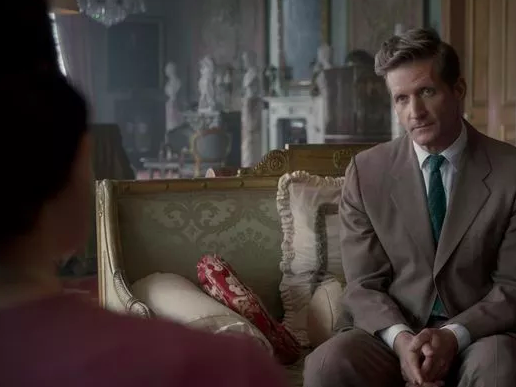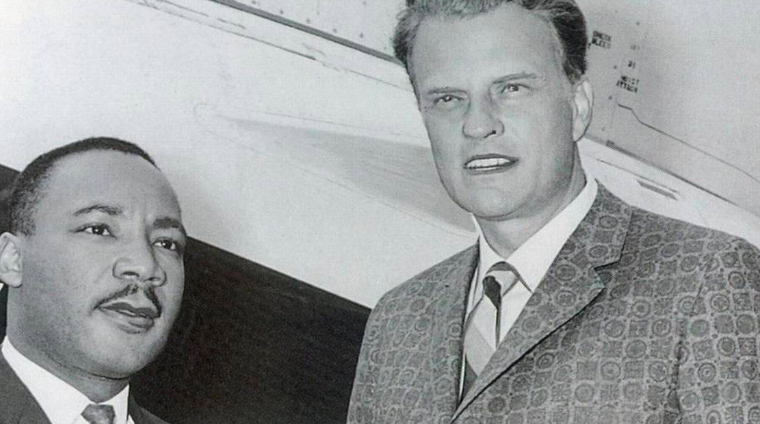February 22, 2018
The Day Billy Graham Met the King
Billy Graham met the Queen many a time in his life. But now in his death he has finally met the King.

I loved the easy manner in which his relationship with the Queen is portrayed in that wonderful Netflix series The Crown. It is warm and intimate. Graham was granted an honorary knighthood by the Queen, and it’s said that the Queen owes her warm evangelical faith to Graham’s influence.
And Billy? Well Billy owes his faith to the King’s influence, who by His Spirit drew the young Graham to himself.
So Billy dies with a legacy untarnished by sexual or financial scandal. True there are some questions about his role in the civil rights movement. Though Billy also met that other king, Dr Martin Luther King, who said of him:
“Had it not been for the ministry of my good friend Dr. Billy Graham, my work in the Civil Rights Movement would not have been as successful as it has been.”
The coming months and years will no doubt further clarify where he stood on these matters. As his gospel declared we are all fallen and sinful and do not truly reflect the glory of our Creator, nor give glory back to him – even as new creation creatures. Hence his apology and repentance for anti-Semitic remarks he made alongside Richard Nixon. Could he have done more? Sure. Could he have done less? Well just ask his contemporaries in the Deep South.

There may well never be another evangelist like Graham – certainly not in the West. His ministry was a true seed ministry, in that it planted gospel seeds in the lives of others who went on to more nuanced, in-depth and long-term ministries. Many evangelical leaders in Australia were converted during his crusades here in the 1950’s.
While there may well never be another Billy Graham, what seems more certain is that there will never be another slice of culture like he experienced in the West which allowed his ministry to flourish.
A number of factors came to play: a thirst for a less-formal and more authentic Christianity grounded in conversionism; a loosening of denominational ties; a certain cultural unity prior to the sexual revolution of the 1960s; and the rise of mass media centred around a culture of broadcast technology.
With the cultural splintering going on today, along with the dazzling refracted light of so many digital technologies and media that narrowcasts to increasingly niche markets, it’s hard to see mass appeal recurring like Billy garnered. Though that’s without taking God and the variances of history into play!
This struck me in the late 80s when I went to a televised Graham event. What was once an event to bring inquirers was inhabited uniquely by Christians come for various reasons; encouragement, reminder, nostalgia. But very few of what we have come to call the Nones.
It’s instructive that that huge wave of revival in the West collapsed in the early 1960s with the rise of the Sexual Revolution. Not a slow decline, but a collapse. It’s almost as if God were preparing, through Graham, a group of soon-to-be-church leaders to navigate the water of the next thirty years.
But times have indeed changed. And perhaps it was in the UK, where another Dr – Dr Martyn Lloyd-Jones – put it well in his sermon, oft quoted by Tim Keller, about the demoniac boy for whom “the demon is in too deep”. Lloyd-Jones commented that the cultural time was seemingly impervious to the old method of evangelism.
Keller describes the old evangelism method that exhorted people as its starting point: “To do what they know they should do. To confess sin, repent and get right with God by trusting in His King’s cross work for them that deals with God’s righteous wrath.”
I for one believe that is still the essence of the gospel, it’s just that we have to start a lot further back with most people today, because they no longer know what they should do. The average Westerner does not have, lurking under the surface, the framework for seeing that the gospel might be the solution to the problem they find themselves in. They don’t even find themselves in a problem to which they are not their own ultimate solution.
Of course that fracturing is not confined to religion. Our array of social media, communications that promise connectivity, and sheer blinding choice, means that focussed, narrow casting messages are more effective. As the great Northern Irish boxer Barry McGuigan commented recently:
“In the 1980s you had one TV and four channels and you watched it as a family. Now we have at least three TVs in the house and 500 channels. When I fought against Pedroza, 19 million people watched it on BBC. My second title defence against Danilo Cabrera in Dublin got the same figures.We’re never going to get all those eyeballs looking at one fight again. That’s something that boxing just has to accept.
19 million! Not on pay per view , but on British terrestrial TV!
Boxing has to accept that that number of eyeballs will never again look at one fight. Evangelism has to accept it too. Far fewer numbers of eyeballs will every publicly witness another evangelist like Billy Graham in the flesh, or indeed on media platform.
But we keep evangelising nonetheless. Why? Because one day every set of eyeballs that has ever lived will see the King coming in his glory. And eyeballs or not, in his pre-resurrection state, Billy lived for the day he would see the King, and he wanted as many people on the planet to do so as well.
Written by
There is no guarantee that Jesus will return in our desired timeframe. Yet we have no reason to be anxious, because even if the timeframe is not guaranteed, the outcome is! We don’t have to waste energy being anxious; we can put it to better use.
Stephen McAlpine – futureproof
Stay in the know
Receive content updates, new blog articles and upcoming events all to your inbox.


